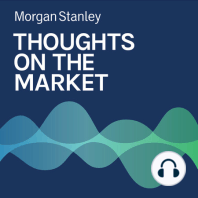3 min listen
Quantitative Strategies: A 2023 Return?
ratings:
Length:
10 minutes
Released:
Jan 11, 2023
Format:
Podcast episode
Description
In 2022 it seemed like there was nowhere to hide from the negative returns in traditional investing. But if we look to quantitative strategies, we may find more flexibility for the year ahead.----- Transcript -----Vishy Tirupattur Welcome to Thoughts on the Market. I am Vishy Tirupattur, Morgan Stanley's head of fixed income research and director of Quantitative Research.Stephan Kessler And I'm Stephan Kessler, Morgan Stanley's global head of Quantitative Investment Strategies Research.Vishy Tirupattur And on this special episode of the podcast, we will discuss the return of quantitative investing. It's Wednesday, January 11th, at 10 a.m. in New York.Stephan Kessler And 3 p.m. in London.Vishy Tirupattur Stephan, 2022 was a pretty dismal year for traditional investment strategies across various asset classes. You know, equities, credit, government bonds—all of them had negative total returns for the year. And in fact, for traditional investment strategies, there really was nowhere to hide. That said, 2022 turned out to be a pretty decent year for systematic investing or factor investing or quantitative investing strategies. So can you start us off by giving us an overview of what systematic factor strategies are and how they performed in 2022 versus traditional investment strategies?Stephan Kessler Absolutely. So, if you look at quant strategies, or systematic strategies, key is 'systematic.' So we look at repetitive, persistent patterns in the markets which can be beneficial for investors. Usually they're data driven. So we look at data which can be price data, fundamental data like economic growth data and the like, which then gives us signals for our investment. Those strategies tend to have low long-term exposures to traditional markets such as equities and fixed income. So they work as diversifiers and the rationale for why they work comes from academic theory, by and large, where we look at risk premia, we look at structural or behavioral patterns that are well known in the academic world. So common strategies that investors apply can be carry investing, for example. So we benefit here from interest rate differentials where we borrow, for example, money in low yielding regions or currencies, and then we invest in high yielding currencies, clipping the difference in the interest rate between these regions. Value investing is another important style that investors implement, where they simply identify undervalued investments, undervalued assets by looking at price to book ratios, by looking at dividend yields, for example, to identify what appears to be cheap. Momentum investing is probably the third most important strategy here, which is where we benefit from the price trends in markets which we know to be persistent. So those are the, I think, the important styles—carry, value and momentum—but there are also more complex strategies where we model and identify very minute details in markets. We go really deep into the functionality of markets. Then the final point I would make is that these strategies tend to be long-short so they are not long biased as traditional investing is, but they can go really both directions in terms of their positioning.Vishy Tirupattur Investors often ask how quant strategies, that are typically predicated on historical data patterns, can handle volatile market environments with very few historical precedents. 2022 was anything but normal. Don't such market aberrations break quant strategies?Stephan Kessler That's a really good question. If you look at it from the higher level, it does seem like this was a unique market that actually should be challenging for systematic strategies which look at historical patterns. When you dig a little bit deeper, it becomes actually more nuanced. So the strong outperformance of quant in '22, we think is driven by the different catalysts that we saw in the markets. So for example, the tightening by central banks led to substantial and durable macro trends that
Released:
Jan 11, 2023
Format:
Podcast episode
Titles in the series (100)
Andrew Sheets: For Markets, Signs, Signs, Everywhere Signs by Thoughts on the Market
